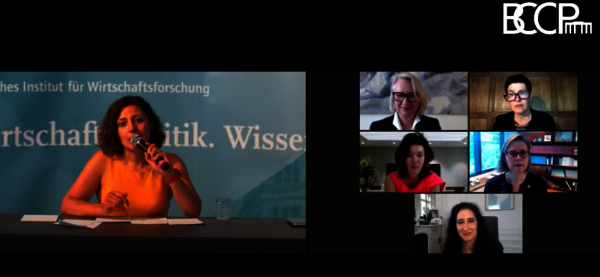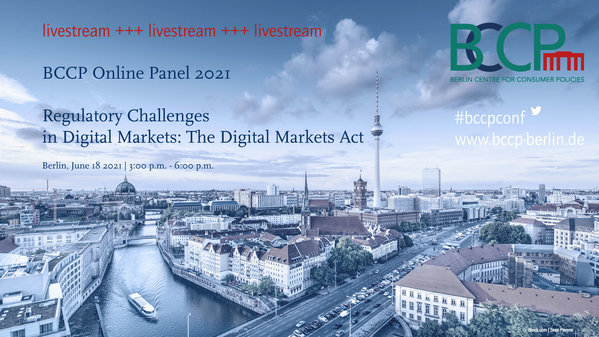BCCP Online Panel 2021
June 18, 2021, marked the sixth annual Conference and Policy Forum of the Berlin Centre for Consumer Policies (BCCP); this year held as an online panel.
The conference focused on the Digital Markets Act (DMA), the EU legislative proposal to regulate digital markets in order to prevent abuses of market power by large digital platforms.
Touching upon an issue at the forefront of current European policy debates, around 100 participants, including academics from law and economics, policy makers, professionals, BCCP Fellows, and the interested public joined the webinar.
Conference review
During the three-hour panel, Cristina Caffarra (Charles River Associates), Isabelle de Silva (French Autorité de la concurrence), Amelia Fletcher (University of East Anglia and Centre for Competition Policy), Fiona Scott Morton (Yale University), and Monika Schnitzer (Ludwig-Maximilians-University of Munich) discussed five topics related to the DMA. The panel was moderated by Özlem Bedre-Defolie (ESMT Berlin).

Cristina Caffarra opened the panel by introducing the objectives of the DMA, highlighting the need for regulation to prevent abuses of market power in digital markets. Monika Schnitzer noted that while the DMA aims to set up rules to achieve this objective, the two overarching goals of the DMA, namely contestability and fairness, are not exactly defined in the proposal. Isabelle de Silva closed the topic stating that she perceives competition law and the DMA as complementary tools, noting that it is uncertain whether agencies will focus more on the DMA or existing competition laws in the future.
The second topic evolved around the question of the definition of "gatekeepers." Amelia Fletcher led this topic, pointing out that although the gatekeeper definition seems to mostly target the top four or five tech firms, those controlling entire ecosystems, it retains enough flexibility to capture more firms if deemed necessary, while simultaneously working to avoid inadvertently including them. Fiona Scott Morton and Cristina Caffarra criticized the lack of clearly defined rules imposed on gatekeepers by the DMA, making self-execution (to ensure compliance from those companies) more difficult.
The third topic focused on merger policy and innovation. Monika Schnitzer argued that existing competition laws do not adequately account for the dynamic dangers arising from mergers. By only requiring firms to inform competition authorities about mergers, she finds the current DMA proposal insufficient. Amelia Fletcher and Isabelle de Silva mentioned in this context several recent evaluations and recommendations to improve merger control for big digital platforms.
Isabelle de Silva then discussed the challenges that can emerge for national competition authorities (NCAs) with respect to the implementation of the DMA. The president of the French Autorité de la Concurrence addressed the absence of a coordination mechanism for competition and DMA enforcement, which she considers problematic. Cristina Caffarra underlined the necessity of clear roles for the NCAs, which implement some of the most important enforcement actions in the big tech sector.
In the final topic, Fiona Scott Morton focused on the five antitrust bills introduced on June 11, 2021, by the House Judiciary Committee in the United States. Amelia Fletcher and Cristina Caffarra praised the introduction of these bills, explaining that antitrust enforcement in the United States has made significant improvements over the last year.
Watch the recording of the entire conference here:
Further information about the conference and the speakers can be found at the conference website.


